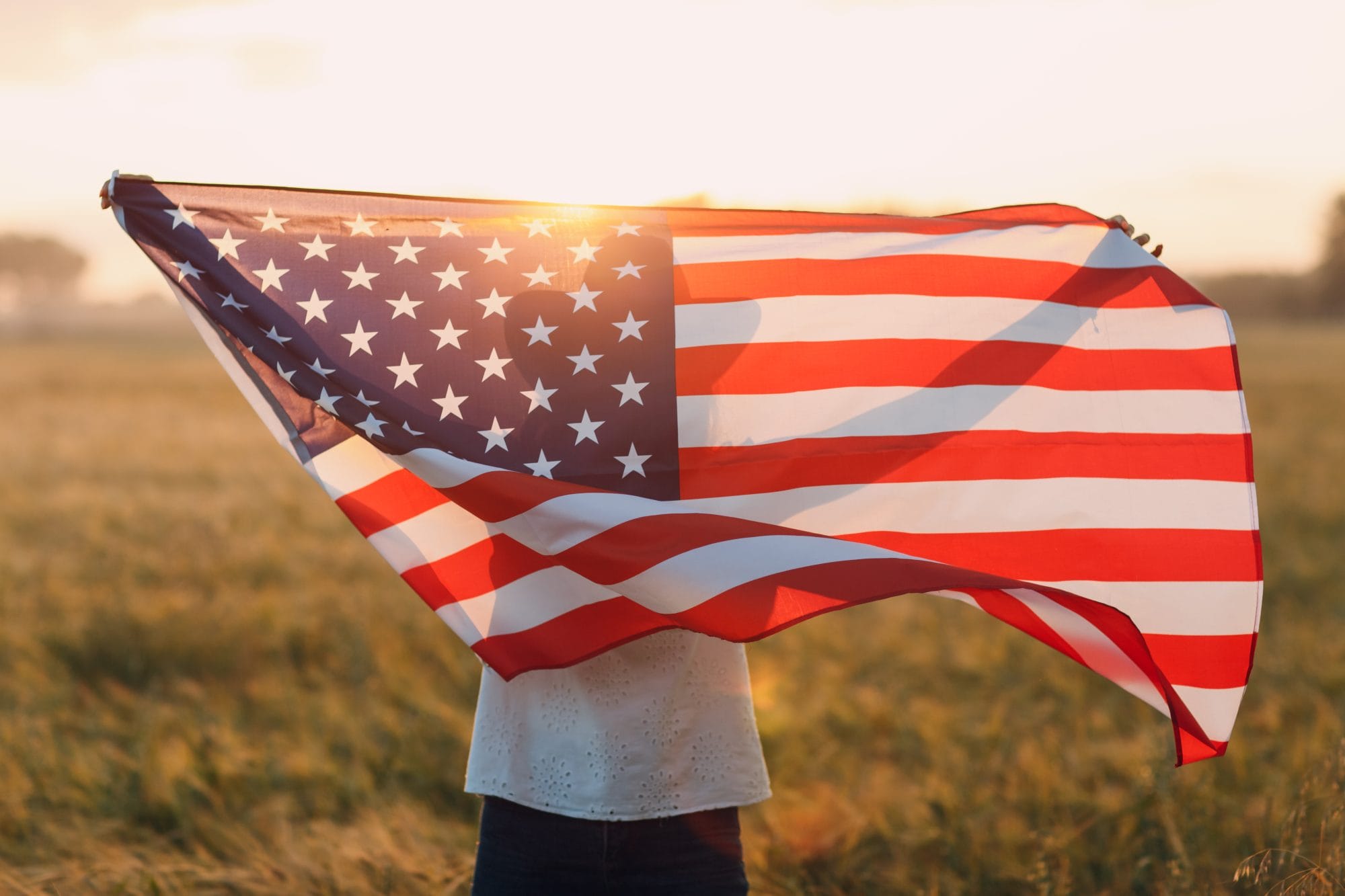Remembering Our Past, Looking to Our Future
Many believe that Enlightenment ideas were the most influential to America in its founding. Yes, Enlightenment ideas played a role, but when you look at the history of America, you will see a more significant influence – the Bible and the Christian worldview. These were a guiding force in forming the ideals of America and what it means to be American, from the Declaration of Independence to the abolition of slavery to the Statue of Liberty’s message to the world: Give me your tired, your poor, Your huddled masses yearning to breathe free, The wretched refuse of your teeming shore. Send these, the homeless, tempest-tossed to me, I lift my lamp beside the golden door!
As we celebrate our country’s independence this 4th of July, let’s take a moment to remember the history of our nation and the godly men and women whose faith and efforts have helped make America a country where all have the opportunity for life, liberty, and the pursuit of happiness.
Roots & Beginnings in America
The heritage of the Puritans and the First Great Awakening influenced how America viewed government, education, and society. The Puritans believed in human depravity and original sin, meaning that no individual, including members of the government, was above corruption or the abuse of power. This skepticism toward unbridled and unlimited authority fostered republican sentiments in the colonies leading up to the American Revolution. The First Great Awakening challenged the hierarchical systems of governing powers deeply ingrained in Europe then. According to the revivalists, a plowboy who had experienced genuine conversion was viewed in higher standing than a bishop who had not. This egalitarian perspective fueled republican ideals that emphasized the equality of individuals and personal spiritual experiences.
Education also played a role in encouraging republican sentiments. American churches led the way in this area of society by establishing schools throughout the colonies. You’ve probably heard of many of them: Harvard, William and Mary, Yale, Princeton, and Brown. At the primary level, education focused on teaching the Bible and grounding people’s understanding in what God’s Word revealed about him, humanity, and the world. Overall, believers in early America thought that a Christian worldview was essential for a society to prosper and be successful. This belief provided the framework for building a flourishing society established by Christian ideals and virtues.
Benjamin Rush: A Renaissance Man
You likely have never heard of Benjamin Rush, but this founding father left an indelible mark in American history as a physician, politician, educator, and social reformer. In his book 32 Christians Who Changed Their World (Canon Press: 2023), Glenn S. Sunshine takes the reader on a journey through the remarkable life of Rush to illustrate the degree to which believers in the American Church shaped American ideals, many of which are deeply embedded in the American psyche to this day.
Growing up, Rush received a Christian education that impacted his studies and work in medicine, politics, education, and social reform. As a physician, he authored chemistry textbooks and was a significant contributor to medical education in the colonies. He was active in politics, writing essays in support of the American Revolution, and eventually served as the surgeon general in the Continental Army. After the war, Rush did not rest on his laurels but focused his attention on societal reform. He taught medical theory and practice and helped establish Dickson College. Rush advocated for mental health reform and humane treatment and care of patients. He was a founding member of the Philadelphia Society for Alleviating the Miseries of Public Prisons, and, as a dedicated abolitionist, slavery was anathema to him. His faith gave him convictions that every man, woman, and child, regardless of background and skin color, had inherent dignity and worth because we are all made in the image of God. Those convictions motivated him in the areas of mental health and prison reform, and the abolition of slavery. They also informed his belief that everyone had inalienable rights that any king or tyrant could not take away. As a champion for education, he understood that educating American citizens on the Bible was crucial for the great “American experiment” to work.
Rush saw a symbiotic relationship between his faith and civic life. To him, there was no religious and secular divide between his faith and his work in education, medicine, politics, and social reform. His Christian worldview informed every area of his life and the biblical principles that guided him and others cannot be overstated in their importance in shaping our nation.
Rush’s life helps us look back into the past and see how truly profound the American Church’s influence was on the founding fathers at the birth of a nation. The Declaration of Independence documents just how influential Rush was because his signature is there to remind us that the idea of America and the “more perfect union” the founding fathers sought to establish was passed on to future generations by men and women of faith who lived out their faith in every area of life…at home…in schools…in the halls of government…in the public square.
A Time to Stand or Fall
Eric Metaxas is known for his biographies of heroic figures in Church history, such as Martin Luther, William Wilberforce, and Deitrich Bonhoeffer. In Letter to the American Church (Salem Books: 2022), Metaxas draws from the bravery of these three men who took a stand against the evils of corrupt power, slavery, and fascism in their lifetimes. His letter is both an encouragement and a warning to the American Church.
It is for good or for ill that America plays an inescapably central role in the world. If you have not read Alexis de Tocqueville on this subject, you likely nonetheless understand that the extent to which that central role has been used for good and for God’s purposes has had everything to do with our churches, or with the American Church, as we may call her. So if America is in any way exceptional, it has nothing to do with the blood that runs through American veins and everything to do with the blood shed for us on Calvary, and the extent to which we have acknowledged this. America has led the world in making religious liberty paramount, knowing that is only with a deep regard for it that we may speak of liberty at all. It was this that made Tocqueville marvel most: that while in other nations—and especially in his own nation of France—the Church was adamantly opposed to the idea of political liberty, in America it was the churches that helped encourage, create, and sustain a culture of liberty.
We have come to that place in history now, and the Lord looks to us, the American Church. Will we be His people now, as the world looks to us in the midst of madness? Our Bible studies and sermons have all been meaningless if we do not make what we learned come alive in ways that are self-sacrificial and that show we really do know that God has defeated death. To do anything less than this is to represent a lie, and to lie to God in doing so. How else shall we put it? This is the hour for which each of us has been born. If we live fully in that freedom for which Christ has set us free, we will see God’s hand in ways we dare not imagine. We will see miracles small and great, and we will see not only revival, but reformation. We will see the goodness of God make its way into everything we do, because that is God’s will for us and for the world at this time. Many who do not yet know the God we claim to worship will see how we live and will want to know Him, and will come to know Him, and will become a part of what He is doing in our generation. Dare we believe that, or are we already headed to the caves, believing nothing we do can matter, and that judgment is falling and all we can do is save ourselves?
There is a precious link between faith and liberty in the United States, which has held together throughout our country’s relatively short history. But that link is under threat in our day. Metaxas is right. Unless the American Church refuses to be cowed into silence and embraces its diving calling and role in society, history will do what it has always done when people forget the past – it will repeat itself.
We in the American Church would do well to look to the past, for it is there that we see our future. Founding fathers such as Benjamin Rush show us the unlimited potential for good and flourishing in our society when we, the Church, actually speak and act like the Church. However, as Metaxas soberly reminds us, the silence and inaction of the German Church that helped the Nazis rise to power in Bonhoeffer’s day allowed untold millions to experience one of the worst manifestations of evil, suffering, death, and destruction that the world has ever seen.
The choice is ours to make, an our decision will determine whether we stand or fall as the Church in our country. Can we, the American Church, come together and work together to speak up, speak out, and take a stand for Christ in our day? Can we make a real difference in our communities and cities by living out the example of many believing Americans before us? Can we be a voice for the voiceless? Can we be champions of justice? Can we use our platforms in our neighborhoods, workplaces, schools, and government to be a “city shining on a hill” and declare the gospel’s good news with how our lives, words, and actions?
I believe we can. With God’s help and guidance, we can. Together we can build a flourishing community.
32 Christians Who Changed Their World and Letter to the American Church are available for purchase in print or digital format.


